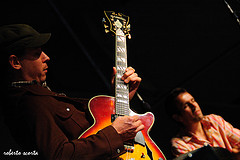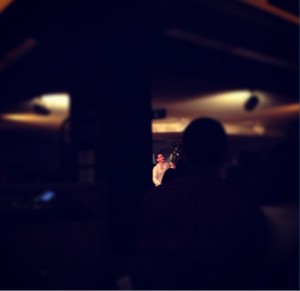 When I saw Kurt Rosenwinkel’s quartet the other night at the Regattabar I was disappointed.
When I saw Kurt Rosenwinkel’s quartet the other night at the Regattabar I was disappointed.
It wasn’t that the performance failed to meet my expectations. The musicians—Rosenwinkel on guitar; Aaron Goldberg, piano; Ugonna Okegwo, bass; Ted Poor, drums—played a complex, cybernetic bebop with, at times, exquisite virtuosity, especially on the part of Goldberg. Rosenwinkel himself is an inspired and inventive soloist whose advanced melodic conception, technically sculpted tone, and what I can only call “sense of drama” made for moments of truly involving musicality.
No, it was not a case of expectations unmet but, rather, of hopes unfulfilled. For what had I hoped? Well, like I said, I’ve seen some pretty good bands lately, bands who played with intensity, sublimity and immediacy and by whom I was alternately astonished and amazed. In fact, I liken such performances to being present at the birth of a god or, at least, at the ecstatic invocation of an all-pervading, otherworldly presence.
I’m the first to admit that this is a lot to ask. This is only music, after all, and these guys are, in the end, simply talented human beings who are good at playing it. In fact, you could think of young(ish) men choosing to play jazz nowadays as akin to antique car enthusiasts or dedicated historical reenactors—not shamans or mystics, but, well, nerdy and gifted craftsmen.
At the same time, I’m not necessarily calling for a return to the acid-fueled days of Coltrane’s Om or Interstellar Space (though that might not be such a bad thing), nor do I think the leading lights of contemporary jazz need to find gurus and get all Mahavishnu on themselves. Nevertheless, there was something that heroic doses of powerful hallucinogens or submission to a spiritual teacher frequently wrought and that was ego-death. And it was this sense of ego-less-ness that was conspicuously missing when I saw Kurt Rosenwinkel, leading to my aforementioned disappointment.
Ego-death isn’t easy, particularly when the thing you are trying to accomplish (like playing jazz well) demands a level of mastery few humans actually attain, which I guess is why it’s that much more impressive when you do eventually encounter it. Setting aside spiritual discipline, the best players achieve it via a commitment and investment in collaborative, collective expression. In such cases, you don’t feel like you’re seeing a virtuoso soloist with accompaniment (although these cats—Vijay Iyer, Jason Moran, Joe Lovano, Charles Lloyd, etc.—are undeniably virtuosos); you feel like your seeing a band.
I don’t know why it was, but Rosenwinkel’s quartet rarely gelled into that kind of mesmerizing meta-entity. There were moments (these guys are pros, after all), such as during their rendition of Mark Turner’s “Casa Oscura,” or sometimes when the rhythm section took flight, but for the most part we were treated to some spectacular instances of individual brilliance (and, for good or ill, guitar heroics) and not much more. (To be fair, part of the problem was the sound mix: Goldberg’s piano was frequently too hot/bright and Okegwo’s bass was perpetually too muddy. That being said, Rosenwinkel’s guitar sound was utterly perfect throughout, though perhaps it was this contrast that highlighted the disjointedness.)
But here’s the funny thing. Even though the performance I saw left me unsatisfied (primarily because I never felt overwhelmed and swept away by it—in other words, the show left my own hapless ego intact when, for my money, I prefer to experience it’s erasure), in the days since I’ve been drawn again and again to Rosenwinkel’s music, scouring the interwebs for any live performances I could find and finding in them again and again an inspiring and original musical vision.
This lingering allure is more than anything else testimony to the fact that Rosenwinkel is, without a doubt, a modern master. What he needs, in my humble, egoless opinion, is a band in which this mastery can be appropriately sublimated. When that happens, it will become, I truly believe, something (that takes us) infinitely higher.
Image Source: Rosco57.
 It’s been a week since I saw Chris Potter play with his quartet (David Virelles (p), Larry Grenadier (b), Nate Smith (d)) and two weeks since I saw Kurt Rosenwinkel with his (Aaron Parks (p), Eric Revis (b), Justin Faulkner (d)) and I’ve been wrestling with how best to describe what made these shows so different and, not to put too fine a point on it, why the Chris Potter show was so much better.
It’s been a week since I saw Chris Potter play with his quartet (David Virelles (p), Larry Grenadier (b), Nate Smith (d)) and two weeks since I saw Kurt Rosenwinkel with his (Aaron Parks (p), Eric Revis (b), Justin Faulkner (d)) and I’ve been wrestling with how best to describe what made these shows so different and, not to put too fine a point on it, why the Chris Potter show was so much better.